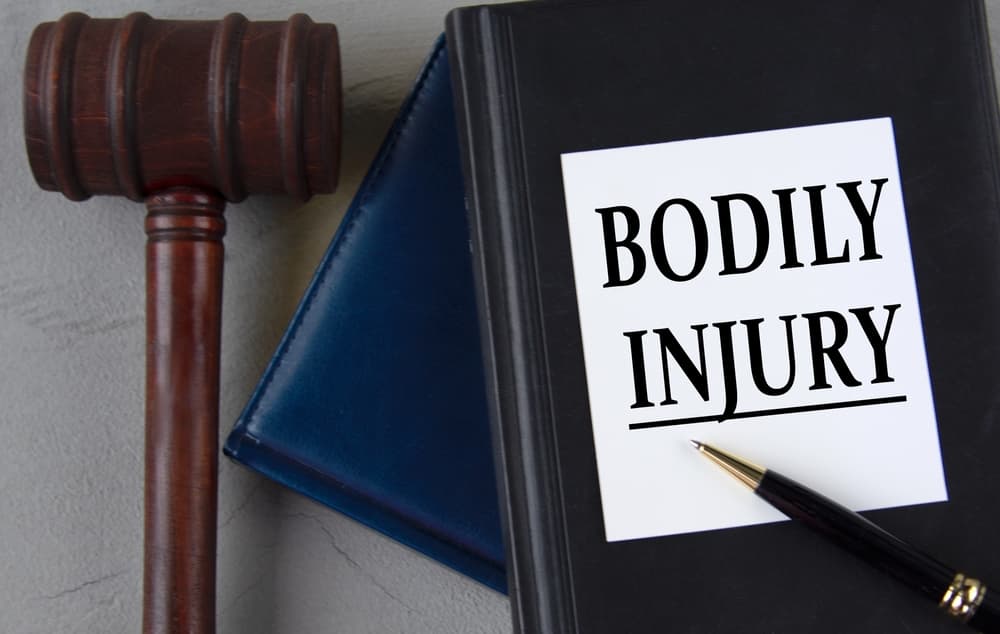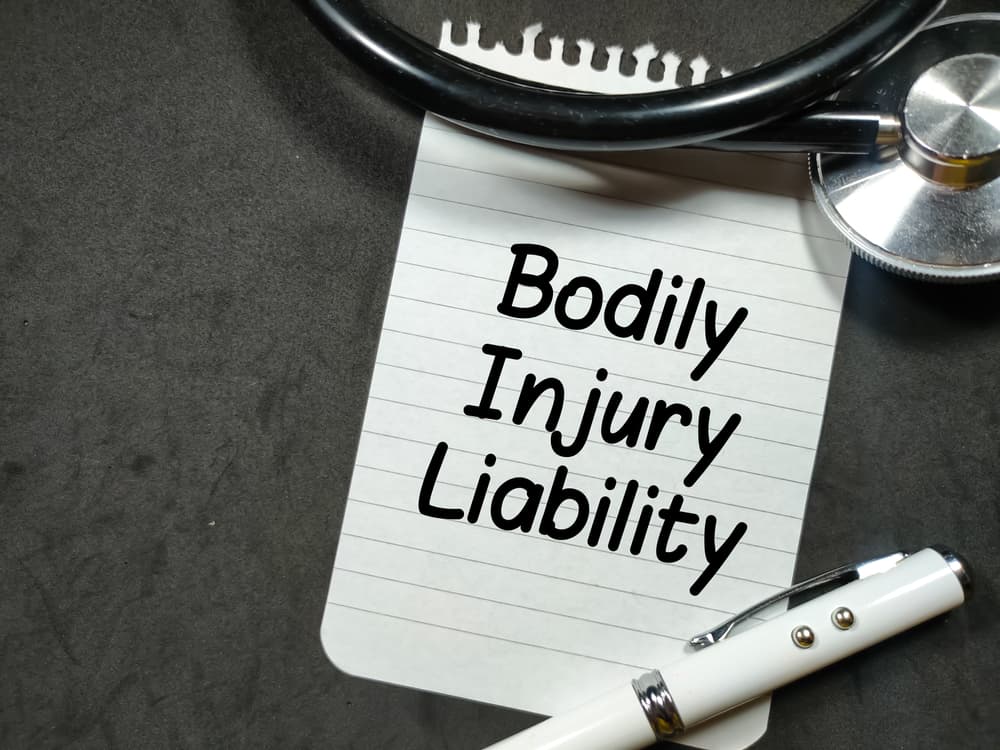When you’re involved in an accident, you may suffer injuries. These injuries can significantly impact your life, causing terrible pain, mental stress, and financial burdens.
If you’re injured in an accident caused by someone else’s negligence, you may have a valid claim for bodily injury. Understanding how these claims work is crucial.
A personal injury lawyer can explain your rights, file your bodily injury claim on your behalf, and represent your best interests. Having an attorney handle your claim can improve your chances of success.
What is “Bodily Injury?”
Following an accident, you may suffer numerous injuries to the body that can be considered bodily injury. A bodily injury is an injury that physically affects an accident victim’s body.
Every state has its own definition of bodily injury. Some states have a more detailed definition, such as an injury that creates a substantial risk of death, serious personal disfigurement, or protracted loss or impairment of the function of a bodily member or organ. Other states, like Nebraska, have a simpler definition, defining bodily injury as “physical pain, illness, or any impairment of physical condition.”
Some common examples of bodily injury you can sustain in an accident include:

- Broken bones
- Traumatic brain injuries (TBIs)
- Spinal cord injuries
- Burns
- Head and neck injuries
It’s important to know how your state defines bodily injury, as this can impact your potential claim. A local personal injury lawyer is familiar with state law and can better assist you.
What Types of Accidents Produce Bodily Injury?
A “bodily injury” can result from several different types of accidents. The most common cause of bodily injury is motor vehicle accidents, including car and truck collisions. Along with these accidents, you can also suffer a bodily injury from a slip and fall, dog bite, or other property-related accidents.
These and other accidents can result in severe, life-changing injuries. The goal of filing a claim for bodily injury is to return to the financial position you were in before your accident or as close to it as possible.
Bodily Injury vs. Personal Injury: What’s the Difference?
Along with bodily injury, you may be familiar with the term “personal injury.” Many use these terms interchangeably, which causes some confusion. While they may seem the same, they’re different.
Personal injury law is an area of civil law that allows victims injured by the actions of others to pursue justice and financial compensation. A “personal injury” is a legal claim arising from an injury. While a personal injury is usually physical, it can also be mental or emotional.
Bodily injury, on the other hand, simply refers to a physical injury. While bodily injury may be part of a personal injury claim, it should not be confused with a personal injury.
Knowing the difference between bodily injury and personal injury is key, especially as you navigate the claims process. Filing and handling a claim can be confusing, so familiarizing yourself with certain legal terms can help avoid uncertainty.
What is Bodily Injury Liability Insurance?
A bodily injury is a physical injury resulting from an accident. Bodily injury liability coverage (BI) under your insurance is something different.
When you hear “bodily injury insurance” or “bodily injury liability coverage,” this refers to the insurance policy that pays for injuries when a policyholder is at fault for an accident. Most states require bodily injury coverage, which is usually included in car insurance policies. The amount of bodily injury liability a policyholder needs varies based on state minimums.
Generally, bodily injury coverage is divided into two parts—this is why you’ll usually see two numbers under this liability policy. So, for example, if a driver has a “10/20,” this means their BI insurance would cover $10,000 per person and $20,000 per accident.
“Per person” means the compensation is available per person in a collision, while “per accident” refers to the maximum the insurance will pay per accident, no matter how many individuals are injured.
The concept of bodily injury coverage can be puzzling. A personal injury lawyer in your area can explain available insurance policy limits for your accident and what this means for your claim.
What Does Bodily Injury Insurance Cover?
Bodily injury liability insurance covers the expenses and losses stemming from your injuries. It does not provide compensation for other accident-related losses, such as property damage.

Generally, bodily injury insurance covers:
Medical Expenses
The costs associated with your collision injuries, such as:
- Doctor’s visits
- Hospital bills
- Medications
- Therapy and rehabilitation
Additionally, BI coverage may provide compensation if you require ongoing medical care.
Lost Income
For many, suffering an injury in an accident can mean time off from work to focus on physical recovery. If you miss work due to your injuries, bodily injury insurance can help provide financial relief.
Pain and Suffering
Pain and suffering refers to the physical and emotional distress caused by your accident and injuries. These damages are non-economic, meaning they’re more difficult to quantify. A personal injury lawyer can gather the necessary evidence to prove your pain and suffering.
Factors that Influence the Value of a Bodily Injury Claim
Several details affect the value of your bodily injury claim. These can include:
- The severity of your injuries
- How your injuries have impacted your quality of life
- How long it takes for you to recover from your injuries
- The total cost of your medical care
- Whether you’ll require ongoing medical treatment for your injuries
Generally, the more severe your injuries and the more extensive your losses, the higher the value of your claim.
Evidence of the at-fault party’s liability is also critical in determining how much your claim is worth. It’s important to evaluate how much evidence is available and the strength of this evidence. Evidence to support your bodily injury claim can include eyewitness testimony, photos, and police reports. Demonstrating the other party’s fault and supporting this claim with evidence can significantly increase the value of your claim.
A personal injury lawyer can do everything necessary to strengthen your bodily injury claim and pursue the most favorable claim result.
What To Do Before Filing a Claim for Bodily Injury
What you do between the time of your injury and the moment you file your claim matters. The following steps can help not only your physical recovery but your financial recovery as well.
Receive Proper Medical Treatment

When it comes to bodily injury claims, getting medical treatment is everything.
You should always put your physical health first. Seeking prompt medical care allows you to understand what injuries you’ve sustained and how serious your injuries are. It can also allow you to begin receiving the medical treatment you need to aid recovery.
Additionally, medical records play a substantial role in bodily injury claims. When you seek medical care and follow through with your treatment, everything is documented in your medical records. The insurance company needs proof of the extent of your injuries before they consider settling your claim, and they can find it in your medical records.
Report Your Accident
Most states have laws concerning accident reporting. Generally, you must notify law enforcement if an accident involves injuries or property damage. Doing so can also help your claim, as police reports hold significant weight.
Preserve Pertinent Evidence
From the day of your accident, you should maintain any documentation you might use to build your claim. Keep anything related to your accident and injuries, from photos and videos to medical bills and invoices. A lawyer can use this and other evidence they obtain for your bodily injury claim.
Connect with a Personal Injury Attorney
Consult a personal injury lawyer in your area as soon as you can. An attorney can provide clarity on your situation and assess your circumstances to determine how to proceed with your claim. Hiring a personal injury lawyer can put you on the right track to compensation.
The Role of the Insurance Company in a Bodily Injury Claim
When you file a bodily injury claim, you’re filing it with the insurance company. Therefore, they play a big role in the process.
Once you file your claim, the insurance company evaluates your accident and the severity of your injuries and losses. Based on their findings, they may decide to approve or deny your claim. Should they approve your claim, they’ll provide a settlement offer depending on how much they believe it is worth. The first offer is usually much less than you deserve - and much less than you likely expect. Fortunately, this is a jumping off point for your lawyer to negotiate.
Throughout the process, your lawyer can communicate with the insurer and provide the required evidence and documentation to try to get full compensation.
Dealing with the Insurance Company Throughout the Claims Process
Dealing with insurance companies is no walk in the park. Any personal injury lawyer can tell you this, as they have extensive experience.
It’s crucial to remember that insurance companies are for-profit businesses. They want to make money and keep their money. Consequently, regardless of what you may believe, insurance companies are not on your side – not even your own insurer.
For this reason, you can almost always expect the insurer to employ sneaky tactics to undervalue your claim. They’ll try to shift liability or assert you’re not as injured as you claim just to avoid paying you what your claim is worth.
This is one of the main reasons why having a knowledgeable lawyer on your side is paramount. An attorney has the skills to handle every step of insurance claims and deal with difficult insurers. They can protect your rights and interests so the insurance company can’t take advantage of you.
The Legal Process of Handling a Claim for Bodily Injury
Filing a bodily injury claim is a process. This process typically involves proving the other party’s negligence and negotiating for a fair settlement. If necessary, your personal injury lawyer can also represent you in court.

Establishing Fault
A majority of accident claims involve negligence. Under this legal theory, a party is negligent when they fail to act with the same level of care that a reasonable person should have exercised under similar circumstances. Simply put, if a person’s wrongful action or inaction caused another person harm, they acted negligently.
Negligence can take many forms, from speeding and running red lights to a failure to fix a dangerous condition on a property, resulting in a victim’s injury. To successfully establish negligence, you must prove:
- The defendant owed you a duty of care at the time of the incident
- The defendant’s actions resulted in a breach of their duty of care
- The defendant’s actions were the direct cause of your accident
- You suffered damages as a result of your accident
When your personal injury attorney can satisfy these elements and provide sufficient evidence, you’re one step closer to obtaining favorable compensation.
Filing Your Bodily Injury Claim
Your personal injury lawyer can prepare and file your bodily injury claim with the insurance company. They can support you through the process and provide documentation and evidence to help achieve a favorable result.
Depending on the outcome of your insurance claim, you may need to file a personal injury lawsuit to continue your pursuit of financial recovery. While the lawsuit process may seem daunting, your attorney can handle all aspects of your case.
Negotiating for a Fair Settlement
At some point or another, you’ll need to engage in settlement negotiations. When the insurance company approves your claim, your lawyer may need to negotiate for a better settlement. If you file a lawsuit, your attorney will try to work with the opposing party to reach a beneficial agreement after the discovery phase.
A Skilled Personal Injury Attorney Can Help You Claim Bodily Injury Following a Car Accident
When you’re injured in an accident, you deserve to put all of your efforts into what matters, like your physical recovery. You can put your bodily injury claim in the hands of a qualified personal injury attorney who can handle your case from beginning to end, representing your best interests throughout the process.